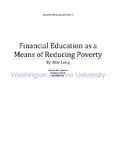Financial Education as a Means of Reducing Poverty

View/
Author
Long, Allison K.
Subject
Washington and Lee University, Shepherd Poverty Program
Poverty
Financial literacy
Predatory lending
Finance, Personal
Credit card fees
Individual development accounts
Education -- Evaluation
Metadata
Show full item recordDescription
Capstone; [FULL-TEXT FREELY AVAILABLE ONLINE] Allison K. Long is a member of the Class of 2011 of Washington and Lee University. Low-income families face many barriers to financial well-being. It is necessary that these barriers be addressed, or they will continue to prevent financial stability. There are many issues that plague low-income families, but I will discuss the most prominent ones that have the biggest impact. These issues are: lack of access to banks and traditional sources of funding, exploitative lenders, credit cards and lack of savings mechanisms. These all have a strong connection to financial literacy, which the rest of the paper will address. After discussing the barriers that low income families face, I will discuss the connection between financial literacy and poverty. Next, I will look at the current effectiveness of financial education in the United States, and then at what makes financial education programs successful. Lastly, I will look at incentive based financial education programs that are run through different mechanisms and discuss their effectiveness. While this paper primarily focuses on financial education as a means of reducing financial instability, I am not arguing against the importance of regulations and policy changes directed at exploitative financial services. These are extremely important initiatives as well, but this paper will show that effective financial education alone can improve the financial well-being of many low-income individuals. [From introductory section] Allie Long